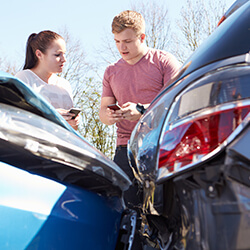
The moments after a car accident can be challenging, even if it was a minor collision and no one was injured. What should you do? Who should you call? How will damages be resolved? Follow these tips to ensure the process goes smoothly.
Safety First
- First and foremost, stay calm, come to a complete stop, and ensure everyone involved is safe.
- If possible, move your vehicle to the side of the road so you're out of harm's way and you don't interrupt the flow of traffic, turn off your ignition and switch on your hazard lights.
Collect Details from all Parties
- It's imperative to collect information from drivers involved in the accident as well as witnesses.
- All drivers involved should exchange names, addresses, phone numbers, plate numbers, driver's licence numbers, and insurance information.
- Refrain from making any agreements with other parties until you consult with your insurer. Do not accept money, accept fault, offer to pay for repairs or agree to forget about the accident altogether.
Gather Details of the Collision
- Take pictures on your phone and jot down details of the collision scene while it is still fresh in your memory. By the time you report the incident to your insurance company, you may forget some of the specifics, like the exact location, road conditions, street lighting, or the events leading up to the accident. Any evidence you provide to your insurer will help them determine who is at fault.
- Related Read: Accident Prone: When Car Accidents Happen
- Related Read: Tips to Avoid Collisions with Pedestrians and Cyclists
Report to Authorities
- It's required by law to report an accident to the police if the damage exceeds the provincial "limit". This limit refers to the damage on both vehicles and varies from province to province. In Ontario and Alberta, the limit is currently $2,000. If a collision is estimated to cost less than $2,000 in total damage, there is no need for police involvement.
- In Ontario, surpassing the limit also requires you to report to a Collision Reporting Centre
- If a collision involves any of the following, you must report it to the police, regardless of the magnitude of the accident:
- Injury or death
- Pedestrians or cyclists
- An illegal act like impaired driving, or driving without a licence or insurance
- A government vehicle
- A vehicle that is transporting dangerous goods
- Damage to private, municipal or highway property (like a resident mailbox or a guardrail)
Contact Your Insurer
- Following the accident, always contact your insurer as soon as possible to file a complete claim, no matter the amount of damage or where the accident occurred (a parking lot fender-bender counts as an accident as well!). You might have difficulty processing a claim if you're late contacting your insurer, or if you're found withholding details.
- Even if you or the other driver already agreed to pay for the damages, your insurer should still be informed of the incident in the event that the other driver still attempts to make a claim against you.
- Make sure your insurance company agrees to pay for all repairs before you have the work completed.
- Find out how your insurer handles supplemental repairs just in case the repair shop finds more damage to your car that wasn't on the original estimate.
- Ask your insurance company if they have a list of preferred repair shops in your area. Sometimes insurance companies have systems already set up with these shops that make processing the claim and getting your car repaired even faster.
- Related Read: At Fault Accident Rules: 10 Common Accidents and Who is at Fault
- Get an official receipt from the repair shop that details all the work they've completed. Make sure the name and address of the shop are clearly identified. You might need to submit this with your insurance claim.
- Inspect all repairs at the auto shop and again when you've returned home to make sure you're completely satisfied with the work.
Once You Repair...
After an accident, people often worry about how it will affect their auto insurance rates. For information that might help alleviate your concerns, compare auto insurance quotes to see how an at-fault, partially at-fault, or not-at fault accident will affect your premiums.




